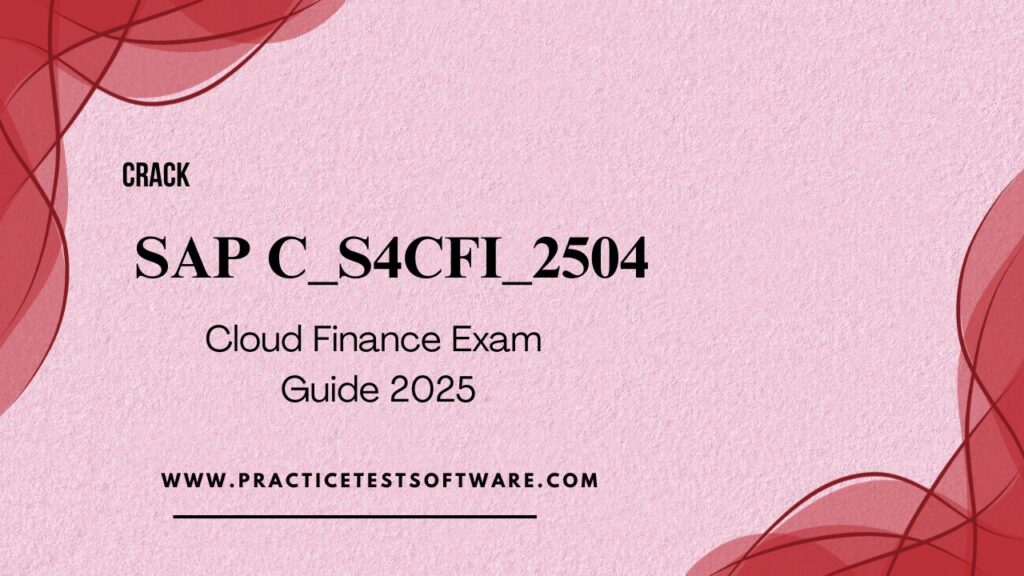As enterprises accelerate their move to cloud ERP, the demand for consultants skilled in cloud financial accounting is rising. The C_S4CFI_2504 certification SAP S/4HANA Cloud Public Edition: Financial Accounting Implementation Consultant is designed to validate your ability to configure, integrate, and optimize financial processes in a cloud context. In 2025, this credential holds strong relevance for professionals working on modern finance transformations.

In this article, you’ll get a fresh, SEO-optimized, unique walk-through (no backlinks) covering the exam structure, essential topics, study strategies, pitfalls, and the value this certification brings to your career.
Why C_S4CFI_2504 Matters in 2025
- Cloud-first finance strategies: Many organizations now prefer cloud ERP for finance, creating demand for skilled cloud finance consultants.
- Seamless integration across modules: Financial accounting in S/4HANA Cloud must integrate tightly with procurement, sales, and analytics.
- Differentiated skillset: Not many consultants combine deep finance knowledge with cloud implementation skills.
- Future readiness: SAP invests heavily in cloud innovation, so mastering this exam helps you stay ahead of evolving features.
Exam Overview
Below is what you need to know about the C_S4CFI_2504 exam (synthesis from latest syllabus sources):
- Number of Questions: ~ 80
- Time Allotted: ~ 180 minutes
- Passing Score / Cutoff: Typically around 65 %
- Exam Level: Associate / Implementation Consultant
- Scope: Focuses on finance in cloud — master data, payables, receivables, asset accounting, record-to-report, integration, extensibility, data migration, and configuration.
Because SAP regularly updates exam content, using materials aligned with the 2025 syllabus is key.
Click Here to Get More Info:
https://www.practicetestsoftware.com/sap/c_s4cfi_2504
Key Topic Areas You Must Master
Here are the core domains and what to focus on in each:
1. System Landscapes & Identity Access Management
- Understand cloud system topology, tenants, and system roles
- Identity and access provisioning, role-based access
- Segregation of duties, access restrictions
2. Configuration & SAP Fiori Launchpad
- How to configure financial apps via Fiori
- Launchpad setup, navigation, tiles, roles
- Optimization of user experience for financial users
3. Cloud Mindset, Fit-to-Standard Workshops & Team Building
- Cloud best practices: minimal customization, standard processes
- Leading fit-to-standard discussions with stakeholders
- Change management implications in cloud adoption
4. Cloud Computing & Deployment Options
- Cloud ERP models and deployment strategies
- Differences between public / private / hybrid landscapes
- Understanding SAP’s cloud architecture constraints
5. Extensibility & Integration
- Extension options in cloud (in-app, side-by-side, custom code)
- APIs, OData, integration flows between modules
- Handling data consistency, error handling in integration
6. Data Migration & Business Process Testing
- Loading master data and transactional data into the cloud
- Data mapping, transformations, cleansing
- End-to-end testing of financial processes
7. Asset Accounting
- Asset master setup, capitalization, depreciation accounting
- Asset retiring, transfers, revaluation
- Integration with general ledger
8. Payables Management
- Vendor invoices, down payments, credit memos
- Payment processes, automatic payment program
- Clearing and reconciliation of payables
9. Receivables Management
- Customer invoicing, credit management, dunning
- Incoming payments, down payments, disputes
- Integration with accounts receivable
10. Record-to-Report
- General ledger posting, accruals, period-end closing
- Financial statements, currency valuation, consolidation (if applicable)
- Month-end, quarter-end, and year-end processes
Sample Scenario: Applying Knowledge
Scenario: A multinational company adopts S/4HANA Cloud for their finance operations. You are assigned to implement the finance module across subsidiaries.
Your tasks may include:
- Configure chart of accounts, ledgers, and currency procedures
- Set up vendor & customer master data with regional attributes
- Implement payables and receivables processes with automatic payment and dunning
- Enable Fiori apps for finance users and assign roles
- Ensure integration with procurement and sales for financial postings
- Migrate legacy data and validate via testing
- Monitor postings, perform closing procedures, and generate financial reports
During the exam, you might see a question like: “How do you configure a dunning level for past-due customers with partial payments?” or “What extension strategy would you choose for custom ledger logic in cloud?”
Click Here to Get More Info:
https://www.practicetestsoftware.com/sap/c_s4cfi_2504
Study Strategy for 2025
A. Start with Official Syllabus
Begin with the official exam syllabus to ensure you cover all required domains. Use it as your roadmap.
B. Use SAP Learning Journeys / Guided Content
SAP offers guided learning paths for cloud finance. These often include hands-on exercises and real-world scenarios.
C. Hands-On Practice
Work in a sandbox or demo cloud system. Configure master data, post transactions, test Fiori apps, and integration flows.
D. Regular Mock Exams
Take full-length practice tests under timed conditions (80 questions, 180 minutes). This builds stamina and reveals knowledge gaps.
E. Drill Edge Cases & Exceptions
Finance exams often include tricky cases: partial payments, foreign currency differences, asset transfers, reversed entries, etc.
F. Track Weak Areas & Review Frequently
Maintain a checklist of topic areas and revisit those where your performance is weak. Use spaced repetition.
G. Stay Updated on SAP Cloud Releases
New versions may introduce changed features or additional best practices. Stay current through release notes and SAP announcements.
Common Mistakes & Pitfalls
- Overlooking configuration constraints specific to cloud (e.g. restricted customization)
- Misconfiguring integration flows leading to inconsistent postings
- Neglecting data migration detail mapping mistakes are common
- Weak testing coverage not verifying negative or exception scenarios
- Poor handling of depreciation, foreign currency valuation, or dunning logic
- Time mismanagement in the exam spending too much time on one domain
Benefits After Certification
- Cloud Finance Expert Role: You’ll be more attractive for projects migrating finance to cloud.
- Career Advancement: Better position in functional consulting, finance transformation, or ERP strategy.
- Credibility: Demonstrates validated expertise in SAP’s cloud finance domain.
- Future-Ready Skills: As cloud continues to evolve, you’ll already be equipped for new features and enhancements.
Click Here to Get More Info:


